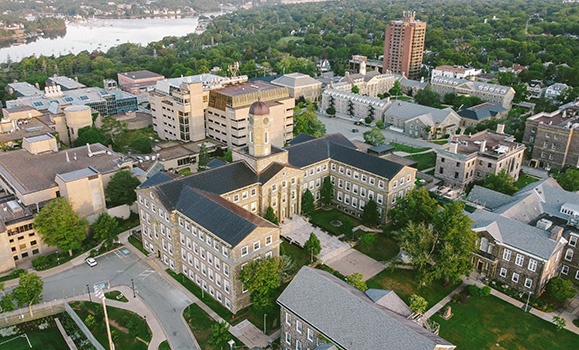Two universities in one? The same . . . but different? These paradoxes confound many but also define the strong (and now century-old) relationship between Dalhousie University and the University of King’s College.
‘Rivals or partners according to the occasion’
In 1920, fire destroyed King’s College in Windsor, N.S. Three years later, in 1923, the governors of Canada’s oldest chartered university were at an impasse: rebuild or relocate? The Carnegie Corporation of New York offered financial assistance to rebuild the university in Halifax and in an association with Dalhousie. On Sept. 1, 1923, the articles of association were signed.
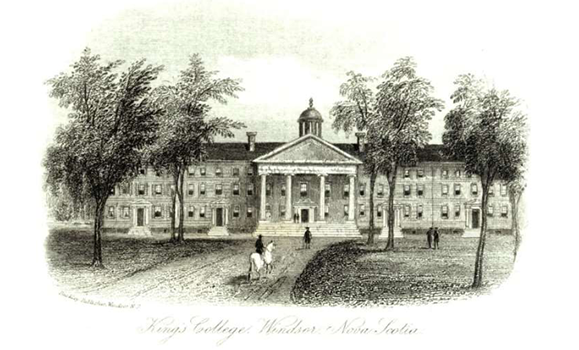
A drawing of the King’s College campus in Windsor, N.S., circa 1800s. (King’s Archives)
King’s rebuilt on the northwest corner of Dalhousie’s Studley Campus, and students and faculty moved to Halifax. In the [Dalhousie] Gazette, King’s students were reassured that “both universities would continue their distinct student traditions, and that Dalhousie-King’s could be rivals or partners according to the occasion.”
While the two universities have long maintained distinct personalities and areas of expertise — e.g., research and innovation (Dal), liberal arts and journalism (King’s) — they also share a common goal: to allow students to become their best selves and strong contributors to society.
The same, but different
Each year, Dalhousie attracts thousands of students from near and far for a broad selection of academic programming. They can choose from 4,000 courses across 200 degree programs in 13 different faculties of study. Dal’s alumni network is also vast, with more than 155,000 graduates worldwide.
By contrast, a couple of hundred first-year students choose the King’s experience each September. “A big part of what differentiates King’s is that intense feeling of togetherness,” says William (Bill) Lahey, president of the University of King’s College. “People know each other on a first-name basis, and that is not just within their residence or within the student population, but it's true between students and faculty, among faculty and between faculty and staff.”
Many King’s students are attracted by the Foundation Year Program (a first-year study of great books and ideas, from the ancient to the contemporary world) and in their upper-level years, will also take courses at Dal. Likewise, upper-year Dal students can enroll in courses at King’s.
“They have different ways of working, but they also have a lot of symbiosis,” says Dr. Roberta Barker (BA’96, MA’97), an alum of both universities who now lectures in the humanities and performing arts at both. “They both have a great dialogue with the sciences, and there are thriving cultures in the arts and humanities at both King’s and Dal.”
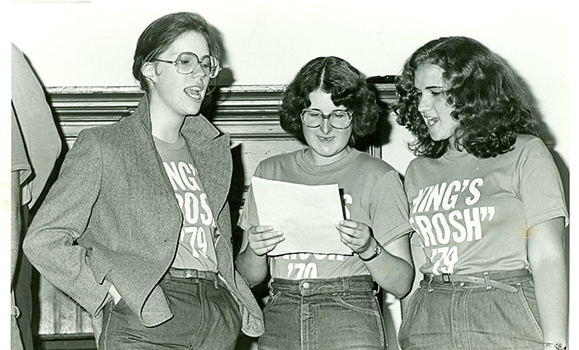
King’s students during Frosh Week 1979. (King’s Archives)
Given the proximity of their Halifax campuses, Dal and King’s students may traverse back and forth several times a day based on how they construct their course load and customize their degrees.
Facilities at both universities, like libraries and athletics departments, exist independently but are available to students at both schools. A student ID from one school is essentially a hall pass to the other.
Before becoming King’s president in 2016, Lahey taught full-time at Dal’s Schulich School of Law and continues to teach there part-time. “I never really felt like I was leaving Dalhousie when I came to King’s,” he says. “They are institutionally two universities, but they're part of one encompassing higher-education community.”
Dr. Kim Brooks, president of Dalhousie, agrees. “Working together on the Dal-King’s 100th has really driven home the importance of our relationship,” she says. “I’m looking forward to talking with staff, faculty and students from both universities throughout the year at events and initiatives to celebrate.”
Story continues after video timeline below
100 years of Dalhousie and King's | A timeline
Carnegie Professors
Another example of enduring cooperation is the Carnegie Professorship. These positions are appointed and funded by both universities and professors have primary teaching responsibilities at Dalhousie, with some faculty responsibilities at King’s.
Dr. Barker, now a Carnegie Professor herself, remembers them coming to King’s to lecture when she was in the Foundation Year Program. “I didn't have any idea that I would be interested in Classics or Latin or medieval philosophy until I heard some of those amazing Dal professors who came over and really blew my mind.”
Dr. Peter O’Brien (BA’90, MA’92) is also an alum of both universities, Carnegie Professor of Classics at Dal, orator and former vice president of King’s. He says his position gives him the unique opportunity to contribute insights to King’s from the Dal point of view, and vice versa. “That double role is really what the Carnegie Professorship is supposed to do,” he says, “to forge links between the two institutions.”
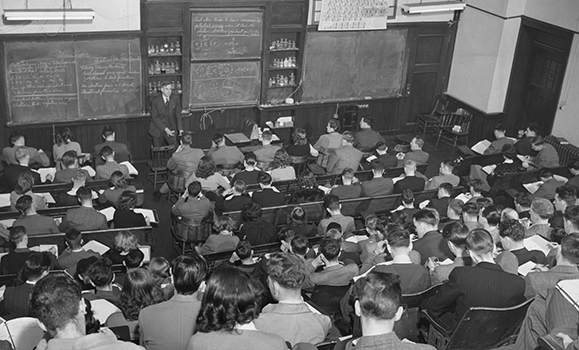
Professor C.L. Bennett giving an English lecture to Dalhousie students circa 1948. (Dalhousie University Archives)
Differentiation in lockstep with cooperation
As Canada’s oldest English-language chartered university, King’s prides itself on its many distinctive traditions, such as Formal Meals at which academic gowns are worn, student societies founded in the late 19th century and Matriculation — a ceremony held each fall to formally welcome new students into King’s — among others.
Dal holds onto its own traditions. Munro Day is celebrated each February, when the university closes to honour one of its earliest benefactors, George Munro. Dal is also currently focused on a future course set by its strategic plan, Third Century Promise.
Differentiation is paramount when considering student experience, but largely immaterial when considering student success. “Each institution is contributing to the success of the other,” says Lahey. “There’s a lot of support and cooperation between the two.”
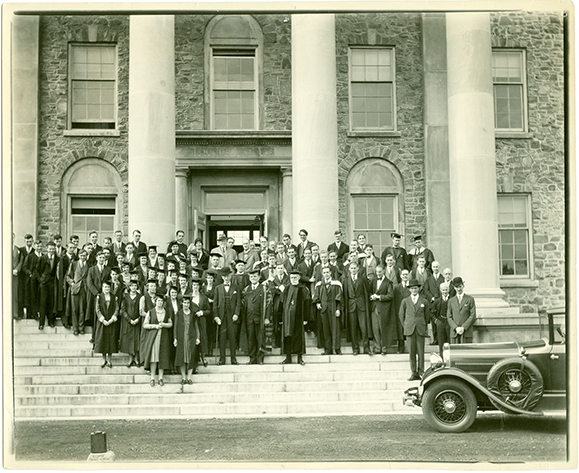
University of King’s College graduating class, circa 1940s. (King's Archives)
That support and cooperation was perhaps never more evident than during the Second World War, when King's buildings became an officer training establishment called “HMCS King’s.” Nearly 3,100 Royal Canadian Navy officers were trained there for sea duty. King's students were moved into Dal residences and their courses moved to the Dal campus.
In the early days and throughout the COVID pandemic, Dal and King's also worked closely to align their policies, practices and communications around public health protocols and remote learning and working. When students were sent home and residences mostly closed, the few King's students who remained on campus moved into a wing of a Dal residence that remained open with social distancing in effect.
Reflection and celebration
Traditionalism has always been a point of pride for both institutions, but Lahey acknowledges that tradition can and should change.
“We're working very hard to evolve,” says Lahey. "It's much more about making sure our community is inclusive and, more specifically, that it includes those communities that have not been part of the past of King’s.”
To celebrate the hundredth anniversary, some special events are in the works. For the first time, King’s will participate in Dalhousie’s Welcome Fair. On September 23, the Dalhousie and King’s men’s rugby teams will play one another in a special anniversary season-opener at Gorsebrook Field. Alumni of both schools are welcome and encouraged to attend the game.
King’s and Dal, alongside the Black Cultural Centre for Nova Scotia, are co-hosting the Universities Studying Slavery (USS) Conference this fall; a research symposium examining the legacy of slavery in higher education. (In the past decade, both universities have commissioned studies into their associations with slavery as they grapple with their colonial histories.) It will be the first time the conference has ever been hosted outside the United States, highlighting what the two institutions can accomplish when they work together.
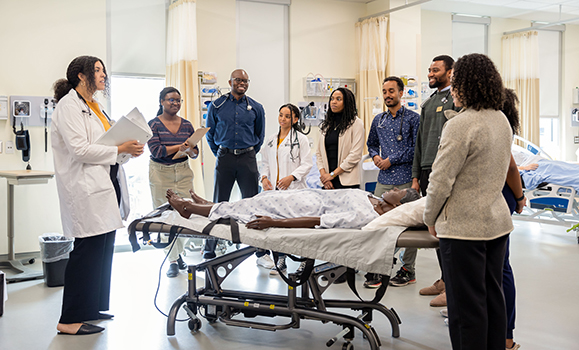
Dalhousie’s University is well known for its medical school. (Cody Turner photo)
"I think that both universities are committed to global belonging in our local context and to better understanding our histories so that we can become more inclusive communities,” says Dr. Brooks. “Working together to host the USS Conference this fall — and doing so during our anniversary year — is a particularly poignant example of that shared set of commitments.”
The vision for the next 100 years at Dalhousie and King’s is clear: forward. Together.

